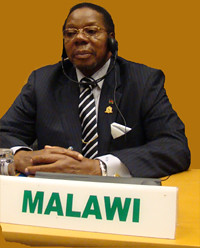
Malawian President in his former capacity as Chairman of the African Union, 54-member state regional organization for the continent. Malawi is being attacked because its hosted by the president of Sudan., a photo by Pan-African News Wire File Photos on Flickr.
Malawi threatens to withdraw from ICC
Saturday, 17 December 2011
LILONGWE- Malawi has threatened to withdraw from the International Criminal Court Treaty after a dispute over its alleged failure to arrest Sudanese President Omar al-Bashir.
Bashir is wanted by the court for genocide.
The court has issued a warrant for his arrest and as a signatory to the Rome Statute that created The Hague-based world court, Malawi was obligated to detain the Sudanese leader on its soil.
The Sudanese leader attended a Common Market for Eastern and Southern Africa (Comesa) meeting the country hosted in October 2011.
Malawi's Information minister Patricia Kaliati said it was surprising that the ICC decided to report the country to the United Nations Security Council whereas it had not taken any action against some of the countries Bashir has visited in the past.
"When we were signing the Rome Statute, we wanted to be part of the international community, not to be targeted. We can as well withdraw our ICC signature," Kaliati said.
She insisted that Malawi would continue defending her position on the matter, saying that they were now waiting for the Security Council's take on the issue.
"We are going to respond once a formal communication has been made to us. We do not have anything on our table so far," she said.
University of Malawi law lecturer Dr Mwiza Nkhata said Malawi can withdraw from the Rome Statute under article 127 by submitting a written notification to the secretary-general of the United Nations.
However, he noted that the withdrawal only takes effect one year after the submission of the notification.
"Crucially, a withdrawal does not affect the obligations that a state party may have incurred while it was still a party . . . such obligations will still persist.
"We can safely assume that joining the Rome Statute was preceded by an informed decision.
"Clearly, the executive would have to explain and justify to the nation why they are withdrawing from the treaty, should they decide to withdraw now," Dr Nkhata added.
The world court on Monday said it was referring Malawi to the Security Council over its refusal to arrest Bashir.
The court said that its pre-trial chamber "decided that the Republic of Malawi failed to co-operate with the court by not arresting and surrendering Omar Al Bashir to the court during his visit to Malawi" in October.
The court "decided to refer the matter to both the United Nations Security Council and the Assembly of States Parties to the Rome Statute."
Malawian President Bingu wa Mutharika had previously said that African leaders should not be dragged to the ICC for offences committed in Africa.
In comments submitted to the court Malawi said that customary international law makes an exception for heads' of state immunity when international courts seek their arrest for international crimes. But the court said that its judges "noted that immunity for heads of state before international courts has been rejected time and time again dating all the way back to World War I."
"Giving the examples of international prosecutions against Slobodan Milosevic, Charles Taylor, Muammar Gaddafi, Omar al-Bashir and Laurent Gbagbo, the chamber noted that initiating international prosecutions against heads of state have gained widespread recognition as accepted practice."
ICC spokesman Fadi el-Abdallah told AFP "it would be up to the United Nations Security Council to determine what measures they will judge appropriate."
President al-Bashir is the first sitting president indicted by the ICC, which issued an arrest warrant on charges of genocide, crimes against humanity and war crimes in Sudan's troubled Darfur region.
The ICC was created through the adoption of its founding statute at a Rome conference in July 1998, and started operating in The Hague in 2002. The ICC is the world's only independent, permanent tribunal with the jurisdiction to try genocide, crimes against humanity and war crimes. All cases opened by the court so far relate to crimes committed in Africa.
Daily Nation/AFP
No comments:
Post a Comment